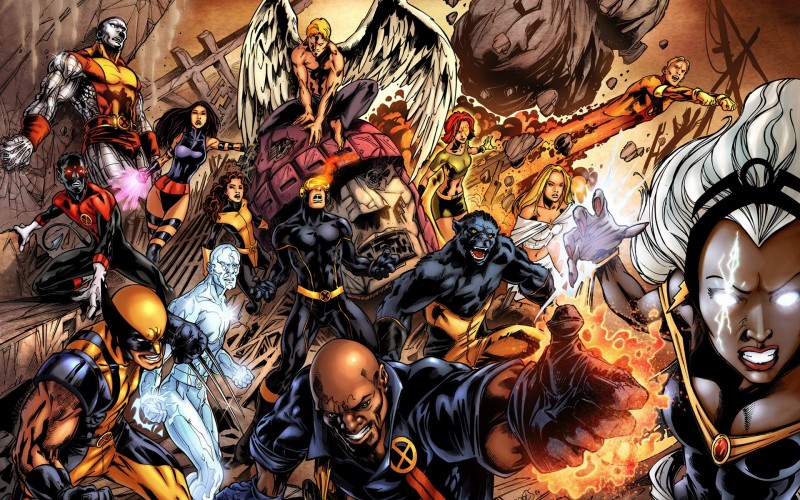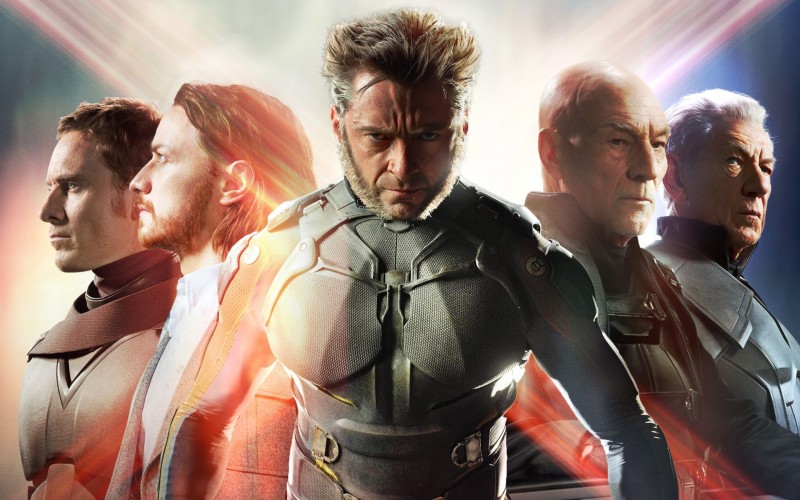X-Men: Are They Still Relevant Today?
Well over 50 years ago, after seeing massive success with comic book characters like Spider-Man, The Hulk, Iron Man, Thor and The Fantastic Four, Marvel Comics mastermind Stan Lee, along with celebrated artist and longtime collaborator Jack Kirby, created the X-Men, mutant heroes born with something called the X-gene, which gave them special abilities. I called them mutant heroes. We're supposed to love and admire heroes. What if however, we didn't like these heroes? In fact, what if we outright hated these heroes because of their abilities or because they were just plain different from us? This is the case for the uncanny mutants. There are those in the world in which they exist, who hate and fear them for no other reason than because they do not conform to the expected standards of society.

Anyone who knows anything about the X-Men is well aware of the history behind their creation. 1963 was the birth year of these characters. The Civil Rights Movement was entering a crucial stage. The struggles the X-Men faced, aside from the super-villains who opposed them, were the everyday people who despised them. African-Americans during the sixties faced similar (albeit much worse) persecution. They were the real life mutants whose perpetual conflicts the X-Men became a metaphor for. During this time the comic book characters were certainly relevant, providing a window for those on the outside, into what it was like to live in fear of your life because of your differences. Or what it was like to be pushed to fight to be recognized as more than a second-class citizen.
You could argue that this article is pointless on some level. You might be saying what do you mean "are the X-Men relevant? They are superheroes, and during this renaissance of the superhero film, it just makes sense to make more X-Men movies." To that I say, you might be right. However, I also say that the point of this article, and I do believe there is a point, is that we remind ourselves just why the X-Men are just as relevant now as they always have been.

Today, the X-Men could be viewed as a metaphor for any disenfranchised population. You can include people of color or members of the LGBTQ community or a different group. Granted, the struggles these groups face may not be taking place on the same scale as those the X-Men deal with, but there are nonetheless, struggles that continue to take place on some level everyday. Don't get me wrong though. X-Men isn't a perfect metaphor the deeper you look into it. If we are to recognize the ways in which the X-Men are relevant for everything it gets right as a metaphor, we should also look at what makes it questionable as an accurate one.
Yes, there is diversity among the ranks of the team and in the universe they inhabit. No two members are alike in that they come from various backgrounds and practice different religions and so forth. Some look like any normal human being, while others have various physical deformities, which make being a mutant more obvious. Though one of the key themes of the X-Men is their struggle for equality, there is a lack of it to be noted and that is one of the flaws about X-Men. Specifically, both in the comic books and in the films, many of the characters are white, while only a handful are people of color. Another piece of that is that the majority of the characters are also male. True, X-Men boasts one of the most expansive rosters of prominent female characters around, but it is still very much a man's world. Look no further than the popularity of X-Men like Wolverine. Where is the equality?

It isn't really present. This isn't to take away from the fact that the X-Men stories are still enjoyable and endlessly thought-provoking. Rather, it is merely an observation of the inequality both in terms of treatment of the mutants, and also in terms of the lack of true diversity. This also is another way in which the X-Men are relevant, for better or worse. Even if tomorrow there were an equal ratio of male to female characters or characters of color to white characters, or more characters of different sexual orientations and so forth, they would still be relevant because at the core, the X-Men are about characters who are not accepted in society. The X-Men are that group of misfits who don't fit in anywhere accept with each other and that makes them endlessly relatable. Any outcast, young or old, black or white can connect to that.
Transcending race, gender, sexual orientation, religion, ideals and all the things that create barriers between us is also what X-Men is about. It is what the X-Men are fighting for; to not be seen as merely mutants, defined by what they are, but to be seen as humans. Just as worthy as anyone else of the right to live in peace. It's what any alienated group is fighting for. This is why the X-Men will remain relevant. The fight continues for Professor X and his children this Friday, May 23.
 Anyone who knows anything about the X-Men is well aware of the history behind their creation. 1963 was the birth year of these characters. The Civil Rights Movement was entering a crucial stage. The struggles the X-Men faced, aside from the super-villains who opposed them, were the everyday people who despised them. African-Americans during the sixties faced similar (albeit much worse) persecution. They were the real life mutants whose perpetual conflicts the X-Men became a metaphor for. During this time the comic book characters were certainly relevant, providing a window for those on the outside, into what it was like to live in fear of your life because of your differences. Or what it was like to be pushed to fight to be recognized as more than a second-class citizen.
You could argue that this article is pointless on some level. You might be saying what do you mean "are the X-Men relevant? They are superheroes, and during this renaissance of the superhero film, it just makes sense to make more X-Men movies." To that I say, you might be right. However, I also say that the point of this article, and I do believe there is a point, is that we remind ourselves just why the X-Men are just as relevant now as they always have been.
Anyone who knows anything about the X-Men is well aware of the history behind their creation. 1963 was the birth year of these characters. The Civil Rights Movement was entering a crucial stage. The struggles the X-Men faced, aside from the super-villains who opposed them, were the everyday people who despised them. African-Americans during the sixties faced similar (albeit much worse) persecution. They were the real life mutants whose perpetual conflicts the X-Men became a metaphor for. During this time the comic book characters were certainly relevant, providing a window for those on the outside, into what it was like to live in fear of your life because of your differences. Or what it was like to be pushed to fight to be recognized as more than a second-class citizen.
You could argue that this article is pointless on some level. You might be saying what do you mean "are the X-Men relevant? They are superheroes, and during this renaissance of the superhero film, it just makes sense to make more X-Men movies." To that I say, you might be right. However, I also say that the point of this article, and I do believe there is a point, is that we remind ourselves just why the X-Men are just as relevant now as they always have been.
 Today, the X-Men could be viewed as a metaphor for any disenfranchised population. You can include people of color or members of the LGBTQ community or a different group. Granted, the struggles these groups face may not be taking place on the same scale as those the X-Men deal with, but there are nonetheless, struggles that continue to take place on some level everyday. Don't get me wrong though. X-Men isn't a perfect metaphor the deeper you look into it. If we are to recognize the ways in which the X-Men are relevant for everything it gets right as a metaphor, we should also look at what makes it questionable as an accurate one.
Yes, there is diversity among the ranks of the team and in the universe they inhabit. No two members are alike in that they come from various backgrounds and practice different religions and so forth. Some look like any normal human being, while others have various physical deformities, which make being a mutant more obvious. Though one of the key themes of the X-Men is their struggle for equality, there is a lack of it to be noted and that is one of the flaws about X-Men. Specifically, both in the comic books and in the films, many of the characters are white, while only a handful are people of color. Another piece of that is that the majority of the characters are also male. True, X-Men boasts one of the most expansive rosters of prominent female characters around, but it is still very much a man's world. Look no further than the popularity of X-Men like Wolverine. Where is the equality?
Today, the X-Men could be viewed as a metaphor for any disenfranchised population. You can include people of color or members of the LGBTQ community or a different group. Granted, the struggles these groups face may not be taking place on the same scale as those the X-Men deal with, but there are nonetheless, struggles that continue to take place on some level everyday. Don't get me wrong though. X-Men isn't a perfect metaphor the deeper you look into it. If we are to recognize the ways in which the X-Men are relevant for everything it gets right as a metaphor, we should also look at what makes it questionable as an accurate one.
Yes, there is diversity among the ranks of the team and in the universe they inhabit. No two members are alike in that they come from various backgrounds and practice different religions and so forth. Some look like any normal human being, while others have various physical deformities, which make being a mutant more obvious. Though one of the key themes of the X-Men is their struggle for equality, there is a lack of it to be noted and that is one of the flaws about X-Men. Specifically, both in the comic books and in the films, many of the characters are white, while only a handful are people of color. Another piece of that is that the majority of the characters are also male. True, X-Men boasts one of the most expansive rosters of prominent female characters around, but it is still very much a man's world. Look no further than the popularity of X-Men like Wolverine. Where is the equality?
 It isn't really present. This isn't to take away from the fact that the X-Men stories are still enjoyable and endlessly thought-provoking. Rather, it is merely an observation of the inequality both in terms of treatment of the mutants, and also in terms of the lack of true diversity. This also is another way in which the X-Men are relevant, for better or worse. Even if tomorrow there were an equal ratio of male to female characters or characters of color to white characters, or more characters of different sexual orientations and so forth, they would still be relevant because at the core, the X-Men are about characters who are not accepted in society. The X-Men are that group of misfits who don't fit in anywhere accept with each other and that makes them endlessly relatable. Any outcast, young or old, black or white can connect to that.
Transcending race, gender, sexual orientation, religion, ideals and all the things that create barriers between us is also what X-Men is about. It is what the X-Men are fighting for; to not be seen as merely mutants, defined by what they are, but to be seen as humans. Just as worthy as anyone else of the right to live in peace. It's what any alienated group is fighting for. This is why the X-Men will remain relevant. The fight continues for Professor X and his children this Friday, May 23.
It isn't really present. This isn't to take away from the fact that the X-Men stories are still enjoyable and endlessly thought-provoking. Rather, it is merely an observation of the inequality both in terms of treatment of the mutants, and also in terms of the lack of true diversity. This also is another way in which the X-Men are relevant, for better or worse. Even if tomorrow there were an equal ratio of male to female characters or characters of color to white characters, or more characters of different sexual orientations and so forth, they would still be relevant because at the core, the X-Men are about characters who are not accepted in society. The X-Men are that group of misfits who don't fit in anywhere accept with each other and that makes them endlessly relatable. Any outcast, young or old, black or white can connect to that.
Transcending race, gender, sexual orientation, religion, ideals and all the things that create barriers between us is also what X-Men is about. It is what the X-Men are fighting for; to not be seen as merely mutants, defined by what they are, but to be seen as humans. Just as worthy as anyone else of the right to live in peace. It's what any alienated group is fighting for. This is why the X-Men will remain relevant. The fight continues for Professor X and his children this Friday, May 23.